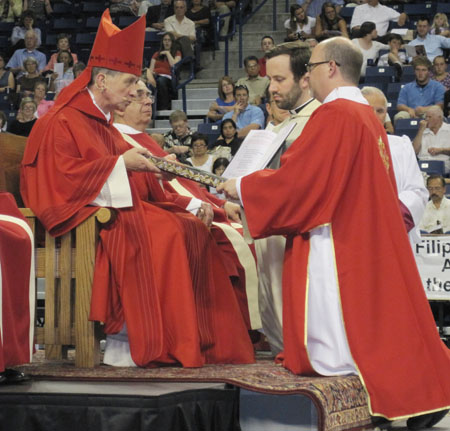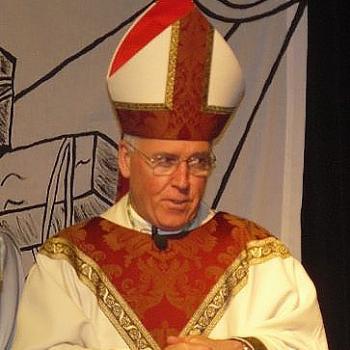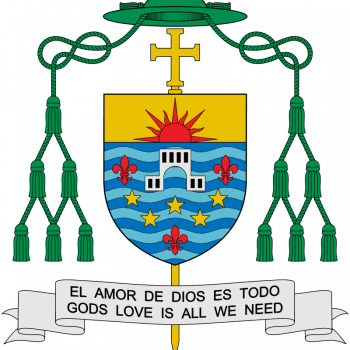A reader from Chicago wrote in this morning, wondering if anyone knows what sort of relationship the new Archbishop-elect has with his deacons.
A little Googling turned up some diaconal news, like this story from a couple years ago:
When he came to Spokane in June 2010, he left 12 years of experience as bishop in Western South Dakota to come to an area where he had never lived. He asked what God’s Word had to say to him with that change, not knowing how he would deal with issues or serve people.
He said his starting point in Spokane has not been his experience but what God wants him to do in the new situation.
“The Word is my barometer helping me focus on what I should be doing,” he said. “God says for me to open my eyes and see what good is happening.”
For example, in August, Bishop Cupich ordained 18 new Anglo and Hispanic deacons to serve in urban and rural settings.
“They represent the pluralistic nature of this area,” he said.
And there was this report on the ordination of 18 deacons for Spokane in 2012, in which he spoke eloquently about the ministry of deacon:
“This sacrament is about what’s happening to those being ordained,” Cupich said. “It’s about what’s happening in the church, this church…it’s about what this sacrament keeps alive in this time and in this place.”
In the Catholic Church deacons have the authority to proclaim the Gospel during services and serve as an ordinary minister during Holy Communion. They can also assist in Baptisms, funerals and weddings and can give certain blessings and preside over various services.
… Cupich said deacons are crucial and allow priests to devote more of their time to teaching.
He said deacons, too, need to teach others about Christ and always be a “testament of the risen Lord.” This is done, he said, through hospitality.
Cupich said the deacons will minister to those whose first language isn’t church.
“People are seeking, people are lost…ambivalent, we have so many people like that in our midst, who don’t speak our language, but we need to listen to Christ…reach out to them,” he said.
A story about that ordination in the diocesan newspaper noted his remarks during his homily:
In his homily for the Mass, Bishop Cupich told those to be ordained that “the word ‘order’ in our tradition … refers to the ordering, the bringing into harmony and setting of priorities, how the community is arranged, ordered and rightly structured. In a word, this sacrament is about more than what is happening to the ordained. It is about what is happening in the Church, this Church and what this sacrament keeps alive as fundamental for the life of our Church.”
He said, “You who are to be ordained will soon process with the Gospel book at Mass and proclaim the word in your communities. I invite you to see in this liturgical action the point of reference for all that you are called to do in your diaconal ministry. I invite you to take pride in knowing that you have a special calling in the life of the Church to keep fresh in our memory and self-understanding that all we do must always about manifesting, making present, testifying to the presence of the Risen Lord….
“This is the dying to self called for in the Gospel, trusting that when the grain falls to the earth and dies it will bear much fruit. Sometimes that dying will come in the form of putting aside your preconceived notions about where and how Christ is working in the world. Was that not the case in this scene in Acts, the apostles had to die to the idea that they could do everything, that God spoke only in the Hebrew language familiar to them or to the chosen people God of Israel.”
He quoted Pope Paul VI’s instruction to the newly ordained: “Know how to accept as an invitation the very reproach which perhaps, and often unjustly, the world hurls against the Messenger of the Gospel. Know how to listen to the groan of the poor, the candid voice of the child, the thoughtful cry of youth, the complaint of the tired worker, the sigh of the suffering and the criticism of the thinker. ‘Never be afraid.’ The Lord has repeated it.”
Bishop Cupich concluded: “I pray this night that your ordination will be a new moment not just for you and your families but for our Church. I pray that your ordination will help us reclaim the priority of making Christ visible and present, active and life giving in all that we do.”
I think anxious deacons in Chicago can relax. They appear to be in very good, supportive hands.
















